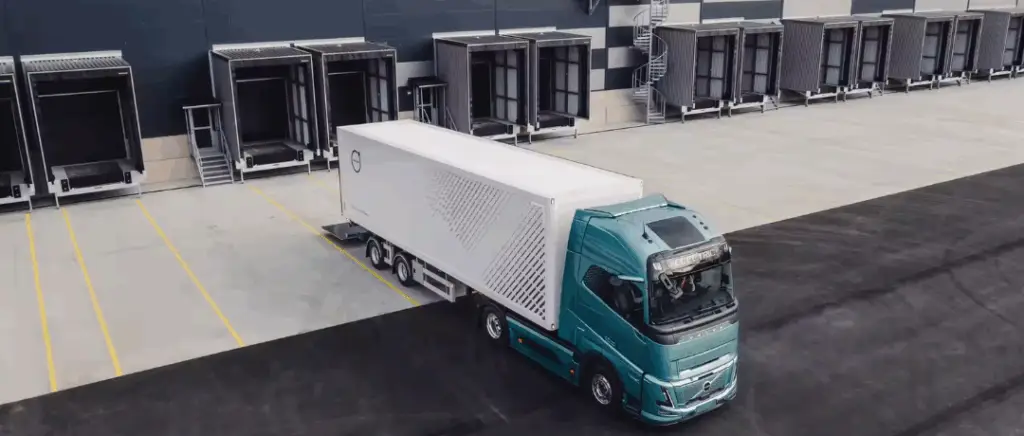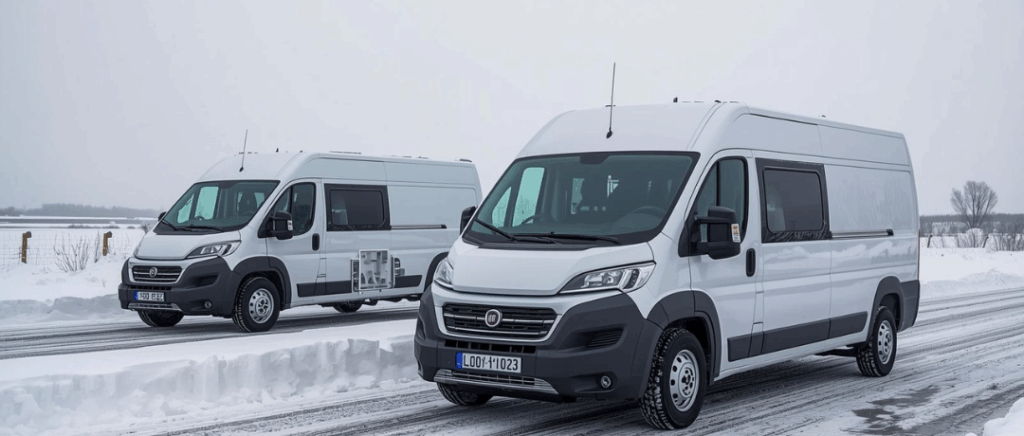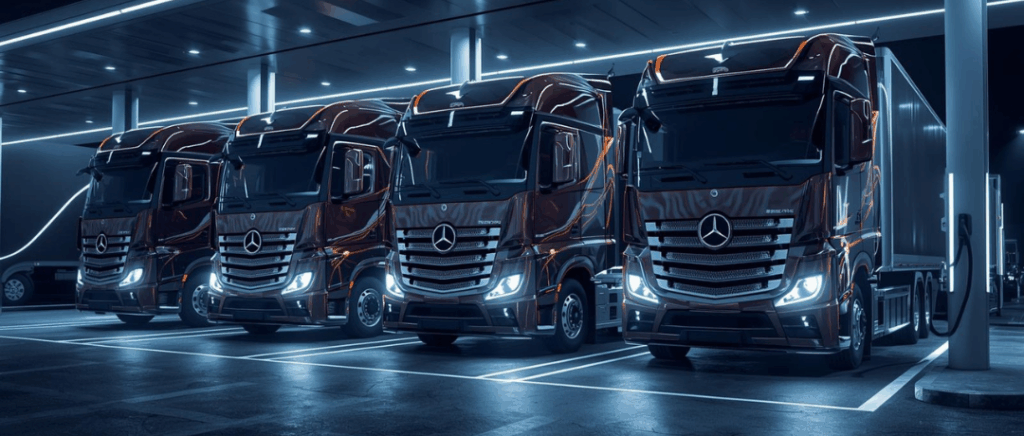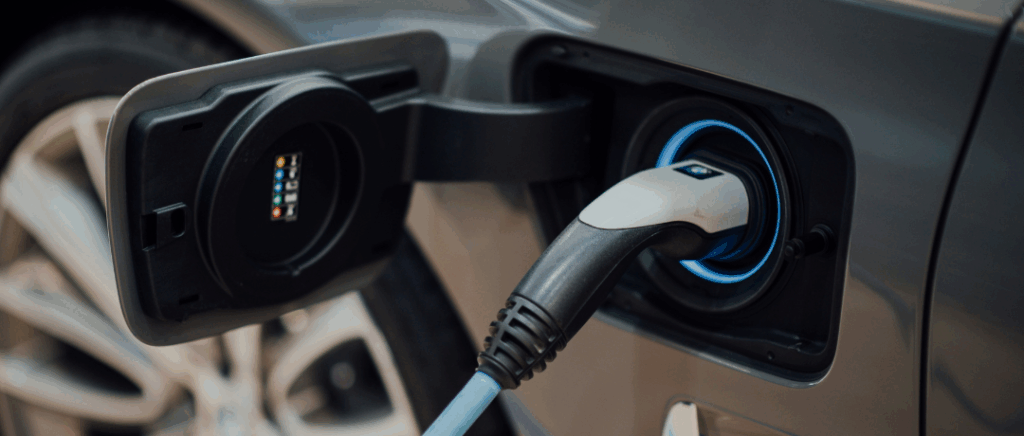How does the Volvo FH Aero Electric perform?
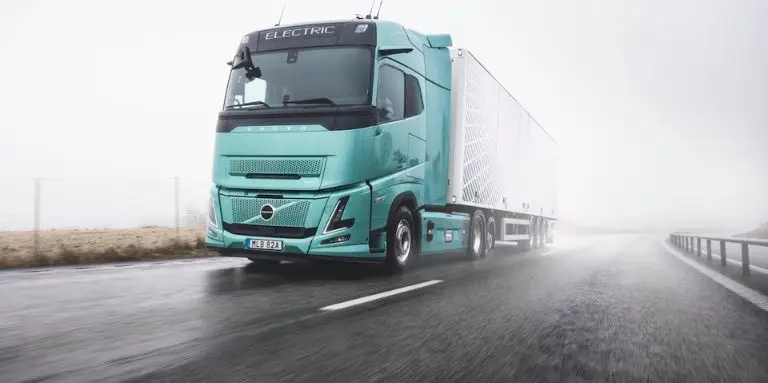
The Volvo FH Aero Electric has established itself as a benchmark solution for companies wishing to combine performance, profitability and the energy transition. Here are the major advantages of this electric truck, designed to meet the practical challenges of professionals in the sector:
- Autonomy long distance FH Aero Electric: With a battery capacity of up to 780 kWh (up to 8 on-board batteries), the FH Aero Electric offers up to 600 km of real range, enabling it to cover long-distance missions without compromising productivity.
- Ultra-fast recharging Compatible with the MCS (Megawatt Charging System) standard, it recharges from 20 % to 80 % in just 40 minutes. This speed optimises downtime, as recharging can be carried out during drivers' statutory breaks, for better vehicle utilisation rates and increased asset rotation.
- Payload and productivity With a total technical weight of 48 tonnes and a payload close to that of a conventional diesel truck, the FH Aero Electric meets the requirements of heavy fleets. Its 6×2 rear tandem configuration ensures optimum weight distribution, even with loaded trailers, without sacrificing transport capacity.
- Energy efficiency Its design aerodynamicswith a cab 24 cm longer and an electric axle (e-axle), reduces energy consumption by up to 5 % compared with previous models. This optimisation translates into a direct reduction in operating costs and greater autonomy on each mission.
- On-board technologies The FH Aero Electric incorporates innovations such as a camera system that replaces rear-view mirrors, improving safety and aerodynamics, as well as an energy management system via Volvo Connect to optimise routes and fuel consumption.
- Accelerated return on investment The combination of long range, rapid recharging and superior energy efficiency means that businesses can maximise the use of each vehicle, reduce energy and maintenance costs, and accelerate the return on investment, even in a demanding energy transition context.
In short, the Volvo FH Aero Electric offers performance designed to make transport companies more profitable and competitive, while meeting the challenges of decarbonisation and operational optimisation in the sector.
How does the FH Aero Electric propulsion system work?
The Volvo FH Aero Electric inaugurates a new generation of propulsion designed to maximise the profitability of long-distance haulage companies while meeting the challenges of the energy transition. Its technical design aims to offer a concrete solution to the sector's operational constraints:
- Integrated electric drive axle (e-axle) This innovative system frees up space under the chassis, allowing up to 8 batteries to be fitted, with a total capacity of 780 kWh. The result: a record range of 600 km, suitable for long-distance traffic without compromising on payload.
- Ultra-fast charging Megawatt Charging System (MCS) The FH Aero Electric is compatible with the MCS standard (up to 1 MW), enabling batteries from 20 % to 80 % to be recharged in just 40 minutes, i.e. during the driver's regular break. This reduced recharging time optimises vehicle availability and limits the impact on tour productivity.
- 6×2 configuration with rear tandem The new architecture distributes the weight of the batteries more evenly, maintaining a payload almost identical to that of a conventional diesel tractor, up to 48 tonnes GVW. Companies no longer have to choose between autonomy and transport capacity.
- Modularity and seamless integration The electric propulsion system is integrated on the same platform as the diesel or gas versions, facilitating the energy transition of existing fleets without major structural investment.
- Energy optimisation through aerodynamics The extended cab and aerodynamic innovations reduce air resistance, which, combined with the electric motor, maximises range and reduces operating costs over the long term.
Benefits for companies :
- Lower operating costs Lower energy costs, simplified maintenance and access to tax incentives accelerate return on investment, even in the face of higher initial acquisition costs.
- Maintaining productivity : Thanks to rapid recharging and a long range, the constraints associated with electric vehicles are lifted for long-distance missions.
- Compliance and image The FH Aero Electric anticipates future environmental regulations, while at the same time enhancing the CSR commitment of transport operators.
In short, the Volvo FH Aero Electric's propulsion system offers companies a robust, cost-effective and sustainable solution to the challenges of decarbonising road transport, without sacrificing operational performance.
A 600 km range for the Volvo FH Aero Electric: what does this mean in practice?
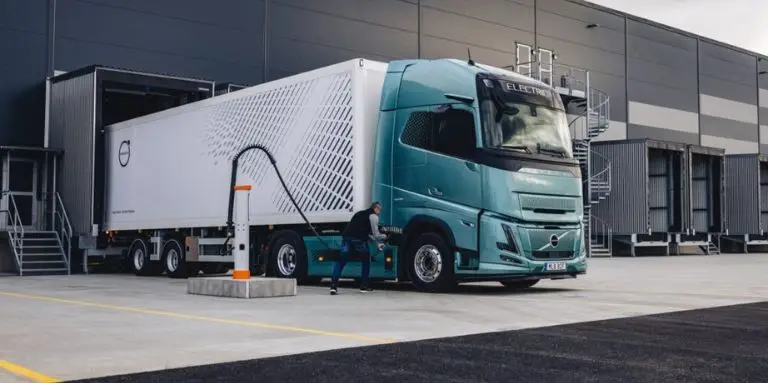
The 600 km range of the Volvo FH Aero Electric marks a turning point for long-distance haulage companies, removing a number of historical obstacles to the electrification of fleets. This technological breakthrough has a direct impact on the profitability, operational organisation and competitiveness of transport operators:
- Optimising return on investment :
- A long range means you can cover inter-regional journeys without intermediate recharging, reducing downtime and maximising vehicle use.
- Ultra-fast recharging (20 to 80 % in 40 minutes via the MCS standard) can be integrated into drivers' statutory breaks, limiting the impact on productivity and optimising logistics planning.
- The ability to maintain a payload close to that of a diesel (up to 48 tonnes GVW) avoids the loss of profitability associated with the weight of the batteries, a challenge often cited for electric trucks.
- A long range means you can cover inter-regional journeys without intermediate recharging, reducing downtime and maximising vehicle use.
- Responding to specific business challenges:
- Managing range is no longer an obstacle to long-distance missions, opening up access to new markets and contracts requiring journeys without compromising performance.
- The integration of Volvo Connect enables precise monitoring of consumption, intelligent route planning and energy optimisation, making it easier to adopt and manage electric vehicles in the fleet on a day-to-day basis.
- Reducing CO₂ emissions meets growing regulatory requirements and enhances the brand's image with principals who are sensitive to decarbonisation.
- Managing range is no longer an obstacle to long-distance missions, opening up access to new markets and contracts requiring journeys without compromising performance.
- Concrete solutions for an effective transition :
- Compatibility with megawatt recharging (MCS) anticipates the evolution of infrastructures and guarantees the long-term future of the investment.
- The optimised aerodynamics of the FH Aero Electric, coupled with brake energy recovery, further improve fuel efficiency and reduce the total cost of ownership (TCO).
- The support offered by Volvo (monitoring, advice, fleet optimisation) makes the transition more secure and speeds up the break-even point for hauliers.
- Compatibility with megawatt recharging (MCS) anticipates the evolution of infrastructures and guarantees the long-term future of the investment.
In short, the 600 km range of the Volvo FH Aero Electric is not just a technical feat: it offers transport companies a mature, competitive solution that is adapted to the economic and environmental requirements of the sector, while facilitating a rapid and measurable return on investment.
Ultra-fast charging for the Volvo FH Aero Electric: what does the MCS standard allow?
The MCS (Megawatt Charging System) standard revolutionises the charging of electric heavy goods vehicles like the Volvo FH Aero Electric thanks to major advances specifically designed to meet the needs of long-distance haulage companies.
What the MCS standard allows:
- Unrivalled charging power The MCS offers a maximum power output of 3.75 megawatts (3,000 amperes at 1,250 volts), ten times more than the current high-speed standards for electric cars. This means that huge batteries can be recharged in just a few minutes, for example a battery 312 kWh in just 5 minutes.
- Drastic reduction in downtime The power of this system means that recharging times can be cut from several hours to less than an hour, or even a few minutes, optimising vehicle rotation and fleet availability.
- Interoperability and global standardisation MCS is designed to become the universal standard for trucks, buses and heavy industrial vehicles, guaranteeing compatibility between different manufacturers and charging networks.
- Safety and robustness The system incorporates advanced safety features (pre-signalling, earthing, short-circuit protection), standardised communication (ISO 15118) and a robust design suited to intensive use on logistics platforms.
- Operational flexibility The MCS allows rapid manual reloading or automation, making it easy to integrate into existing logistics flows without the need for robots or complex equipment.
- Preparing for future use V2G: It provides for bi-directional energy management (V2G), paving the way for new business models based on the storage and resale of electricity by fleets.
In short, the MCS standard makes it possible to recharge electric trucks ultra-fast, eliminating the main obstacle to long-distance electrification: downtime. As a result, companies can maximise the return on their electric fleet investment, optimise productivity and adopt a sustainable approach without compromising operational efficiency.
Is the Volvo FH Aero Electric suitable for real long-distance transport?
The Volvo FH Aero Electric marks a major step forward for electromobility in the long-haul road haulage sector, a segment that has historically been difficult to electrify. Several key features demonstrate its suitability for the demands of real long-distance haulage:
- Range up to 600 km :
This range places the FH Aero Electric among the most efficient electric trucks on the market, covering the majority of long-haul missions without intermediate recharging, which until now has been a major obstacle to the electrification of the sector. - Ultra-fast recharging :
Thanks to its compatibility with the MCS (Megawatt Charging System) standard, the truck can recharge its batteries from 20 to 80 % in just 40 minutes. This time corresponds to the regulatory break time for drivers in Europe, allowing recharging to be integrated without impacting on the productivity of long-distance journeys. - Competitive payload :
With a payload capacity close to that of a conventional diesel truck and a Gross Vehicle Weight Rating (GVWR) of up to 48 tonnes, the FH Aero Electric meets the needs of hauliers without compromising on carrying capacity, thanks to a 6×2 axle configuration and an electric axle (e-axle) that can carry up to 8 batteries (780 kWh). - Logistics optimisation :
The integration of fast recharging into the legal break times, combined with extended range, means that long-distance operations can be carried out over a single day, while maintaining profitability and flexibility of planning. - Reducing emissions :
By targeting the long-haul segment, the FH Aero Electric significantly reduces CO2 emissions from road transport, where the environmental impact is greatest.
In short, the Volvo FH Aero Electric is designed to meet the demands of real long-distance transport, combining high range, ultra-fast charging and a suitable payload. This makes it a credible solution for the decarbonisation of road transport, without compromising the productivity and profitability of transport companies.
Make your energy transition now, with a range of new 100 % electric vehicles available for leasing from Beev!
When will the Volvo FH Aero Electric be available and at what price?
The launch of the Volvo FH Aero Electric, the new long-haul electric truck from Volvo Trucks, is already generating a great deal of interest in the sustainable transport sector. Here are the key details of its availability and pricing:
Commercial availability of the Volvo FH Aero Electric :
- Orders for the Volvo FH Aero Electric are expected to open in the second quarter of 2026, with transport companies able to submit a letter of intent to purchase as early as spring 2025.
- This timetable is part of Volvo Trucks' strategy to accelerate the transition to zero-emission solutions for long-distance transport.
Price and positioning of the Volvo FH Aero Electric :
- Volvo Trucks has not yet officially announced the selling price of the FH Aero Electric. However, given its cutting-edge technology (range of 600 km, ultra-fast recharging of up to 1 MW, battery capacity of up to 780 kWh), it is one of the premium solutions on the electric HGV market.
- The final price will also depend on the configurations chosen (number of batteries, connectivity options, associated services via Volvo Connect).
Summary of technical specifications for the Volvo FH Aero Electric
| Features | Detail |
|---|---|
| Autonomy | Up to 600 km |
| Battery capacity | Up to 780 kWh (8 on-board batteries) |
| Refill | 20 % to 80 % in 40 min (MCS standard, up to 1 MW) |
| Gross Vehicle Weight Rating (GVWR) | Up to 48 tonnes |
| Configuration | 6x2 with rear tandem axle |
| Propulsion | Integrated electric drive axle (e-axle) |
| Cabin | 24 cm longer for aerodynamics |
| Design | Aerodynamic optimisation (-5 % energy consumption) |
| Technologies | Volvo Connect, camera system energy management |
| Objective | Long-distance transport, profitability, energy transition |
| Availability | Orders from the 2nd quarter of 2026 |
| Prices | Not communicated but premium positioning |
Conclusion
The Volvo FH Aero Electric is a major breakthrough in long-haul road transport, combining an unprecedented range of 600 km, ultra-fast charging thanks to the MCS standard, and a payload equivalent to that of diesel trucks. Thanks to its technological innovations (electric drive axle, aerodynamic design, intelligent management via Volvo Connect), it provides an effective response to the challenges of productivity, profitability and the ecological transition. Its ability to integrate recharging into operating cycles, while maintaining high operational performance, makes it a practical, long-term solution for companies wishing to anticipate environmental regulations and optimise their return on investment. The FH Aero Electric positions Volvo as a key player in the decarbonisation of the sector, without compromising efficiency or competitiveness.
Do you want to go electric? Beev can help you make the transition to greener, more sustainable mobility. Whether you're an individual looking for a installation of home charging points or a professional requiring installation of recharging points for professionalswe are simplifying theinstallation of a recharging pointby offering you tailor-made solutions to meet your specific needs. So go ahead, install a charging point and set yourself apart from the competition.
You would like toto electric?
Beev offers multi-brand 100% electric vehicles at the best prices, as well as recharging solutions.
